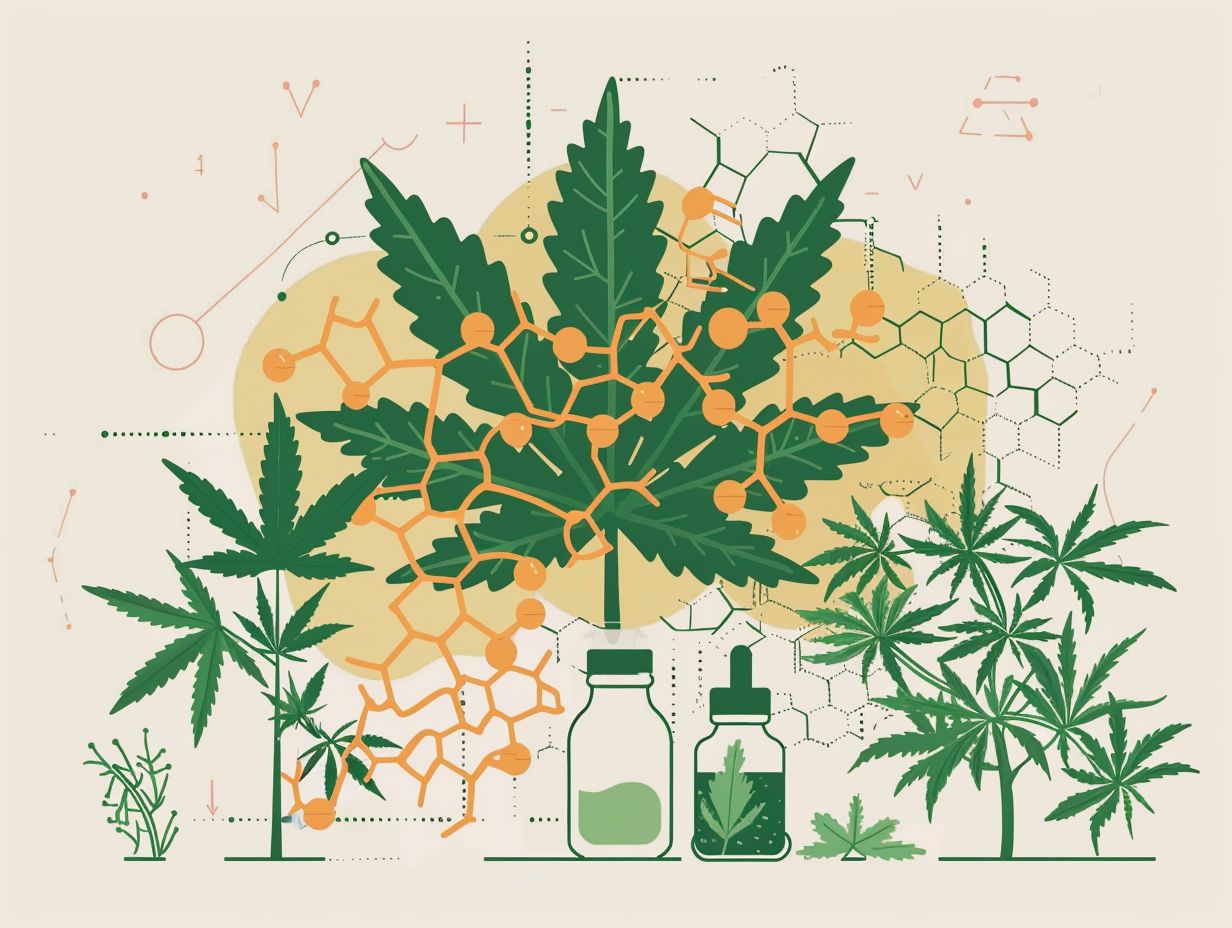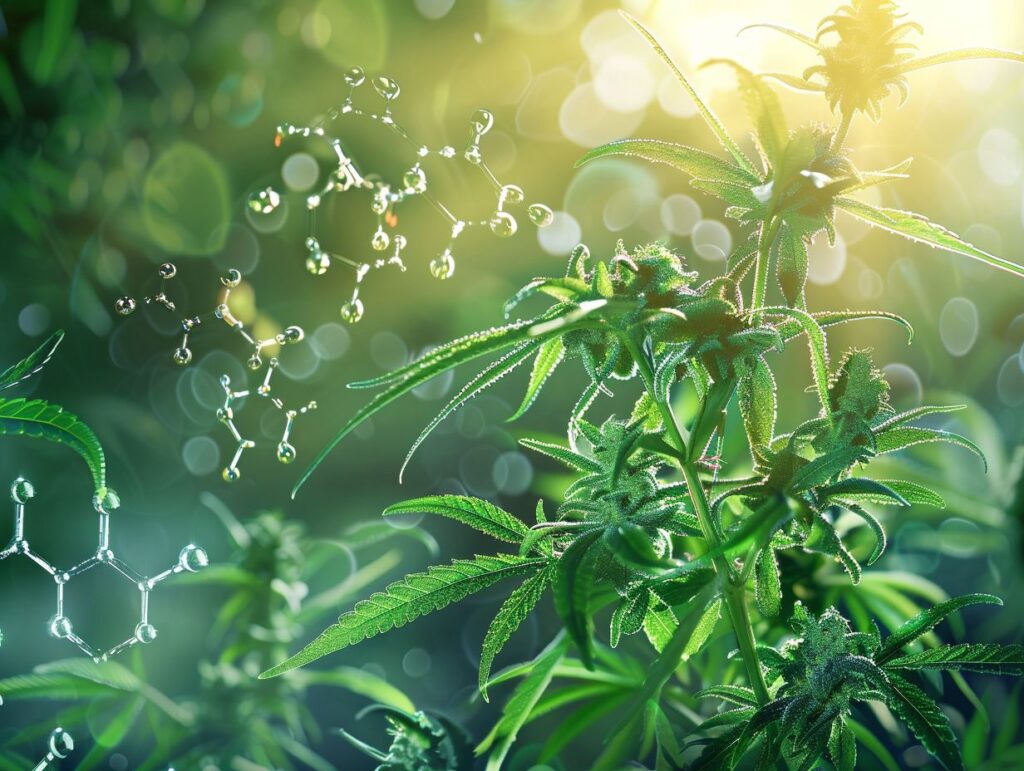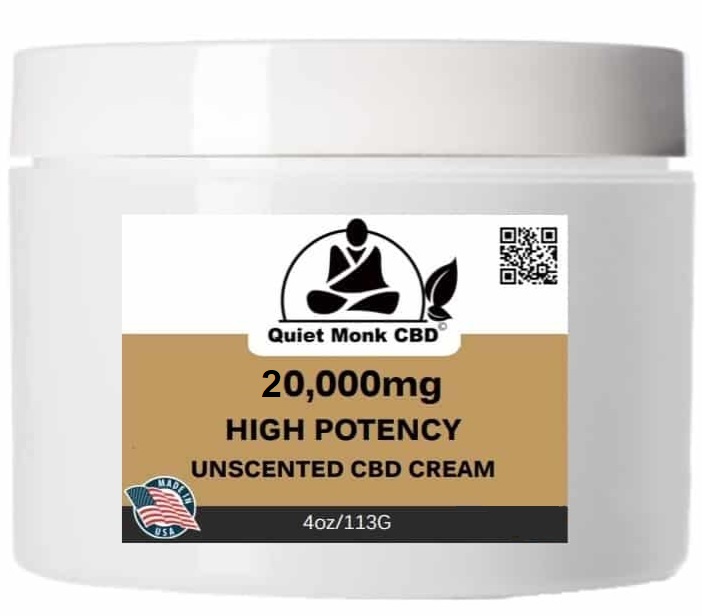
If you’ve been hearing a lot about CBD and CBG lately and are curious to learn more about these cannabinoids, you’ve come to the right place.
I am going to delve into the differences between CBG and CBD, compare their health benefits and side effects, and explore how they work together when taken in combination.
We will also discuss the legal and production aspects of CBD and CBG, as well as provide some tips on how to choose between the two.
So, sit back, relax, and let’s dive into the world of CBD and CBG together.
Introduction to CBD and CBG
CBG and CBD, two significant cannabinoids found in Cannabis sativa, have gained increasing attention for their potential health benefits and therapeutic properties.
These compounds are part of a diverse group of chemical compounds known as cannabinoids, which are naturally occurring in the cannabis plant. CBG, often referred to as the ‘mother of all cannabinoids,’ is considered a precursor to other cannabinoids like CBD and THC.
On the other hand, CBD, short for cannabidiol, has been extensively studied for its potential health applications without the psychoactive effects commonly associated with THC. Both CBG and CBD interact with the body’s endocannabinoid system, a complex network of receptors that play a vital role in regulating various physiological processes.
Understanding CBG and CBD
To understand the intricacies of CBG and CBD, it’s essential to delve into their molecular structures and interactions within the endocannabinoid system.
CBG and CBD, belonging to the family of cannabinoids found in cannabis plants, exhibit unique chemical compositions. CBG, also known as cannabigerol, is considered the precursor to other cannabinoids owing to its role in the biosynthesis process.
On the other hand, CBD, or cannabidiol, interacts with the endocannabinoid system but doesn’t produce the psychoactive effects associated with THC.
Studies have indicated that CBG possesses potential anti-inflammatory and neuroprotective properties, making it a subject of interest for conditions like inflammatory bowel disease and Huntington’s disease.
In contrast, CBD has been recognized for its anxiolytic and antipsychotic effects, showing promise in managing anxiety disorders and schizophrenia.
Differences Between CBG and CBD
While CBG and CBD stem from the same Cannabis sativa plant, their distinct properties and effects set them apart. Understanding the differences in their chemical makeup, mechanisms of action, and potential applications can help individuals make informed decisions about their use for specific health concerns.
One of the key variations between CBG and CBD lies in their chemical composition. CBG, known as the ‘mother of all cannabinoids,’ is considered a minor cannabinoid compared to the more well-known CBD.
CBD, on the other hand, is one of the most abundant cannabinoids found in cannabis.
Biologically, CBG interacts with the endocannabinoid system by binding to CB1 and CB2 receptors, albeit with different affinities compared to CBD. This difference in receptor interaction contributes to their unique therapeutic effects.
Regarding therapeutic benefits, CBG is recognized for its potential anti-inflammatory, antibacterial, and neuroprotective properties, whereas CBD is celebrated for its anxiolytic, anti-seizure, and analgesic effects.
CBG Vs CBD Vs CBN: A Comparison
Comparing CBG, CBD, and CBN provides insights into the unique characteristics of each cannabinoid and their specific roles in addressing health issues.
CBG, also known as cannabigerol, is gaining attention for its potential anti-inflammatory and neuroprotective properties, making it a promising candidate for conditions like glaucoma and inflammatory bowel disease.
CBD, or cannabidiol, is renowned for its calming effects and being non-psychoactive, making it popular for managing anxiety, pain relief, and epilepsy.
On the other hand, CBN, cannabinol, is suggested to have sedative properties and might aid in promoting sleep and relaxation. Researchers are exploring the synergistic effects of combining these cannabinoids to enhance therapeutic benefits.
CBG Vs CBD: Comparing Possible Side Effects
Analyzing the potential side effects of CBG versus CBD is crucial for understanding their safety profiles and mitigating any adverse reactions. Considering their interactions with other medications or conditions can help individuals make informed choices regarding the use of these cannabinoids for therapeutic purposes.
CBG and CBD may cause mild side effects such as dry mouth, dizziness, or changes in appetite. In some cases, they can interact with certain medications, including blood thinners and antiepileptic drugs, potentially altering their effectiveness or causing unintended effects.

Individuals with specific medical conditions, such as liver disease or heart problems, may need to exercise caution when using CBG or CBD due to possible interactions that could exacerbate their health issues.
Regular monitoring for adverse reactions is essential when incorporating these cannabinoids into a treatment regimen, as individual responses can vary significantly.
Health Benefits of CBG and CBD
Studies have shown that CBG and CBD interact with the endocannabinoid system in the body, which plays a crucial role in regulating various physiological processes. CBD has been particularly noted for its anti-inflammatory properties, potentially offering relief for conditions like arthritis and autoimmune disorders.
Additionally, CBG shows promise in inhibiting the growth of certain cancer cells, while CBD has been studied for its anxiolytic effects, helping individuals manage stress and anxiety.
Taking CBD and CBG Together
Combining CBD and CBG can lead to synergistic effects known as the entourage effect, enhancing their therapeutic potential. Understanding how to appropriately dose these cannabinoids and selecting suitable products for combined use is essential in maximizing their benefits.
The entourage effect refers to the enhanced therapeutic effects achieved when multiple cannabinoids work together rather than in isolation. When CBD and CBG are combined, they can complement each other’s strengths and address a wider range of health issues. Proper dosing is crucial to experience the full benefits without adverse effects. It is recommended to start with low doses and gradually increase until the desired effects are achieved.
- For a balanced combination of CBD and CBG, products that offer a 1:1 ratio or a ratio tailored to your specific needs are ideal.
- Some reputable brands offer tinctures, capsules, or topicals specifically formulated to harness the entourage effect of CBD and CBG.
- Always opt for products that are third-party tested and from trusted sources to ensure quality and purity.
How CBD and CBG Work Together
The synergistic interaction between CBD and CBG involves enhancing each other’s therapeutic effects through the entourage effect, where their combined action surpasses individual benefits. Understanding how these cannabinoids work together can aid in optimizing their efficacy for various health conditions.
When CBD and CBG are consumed together, they not only complement each other but also interact with the body’s endocannabinoid system in unique ways. CBD is known for its ability to inhibit enzymes that break down endocannabinoids, thereby prolonging the benefits of naturally produced cannabinoids in the body. On the other hand, CBG has shown promise in binding to specific receptors, influencing neurotransmitter release, and potentially enhancing the overall therapeutic effects of CBD. This intricate dance between cannabinoids results in a more profound impact on the body’s physiology.
The Benefits of Taking CBD and CBG Together
The combined use of CBD and CBG offers a broad spectrum of health benefits, thanks to the entourage effect that magnifies their individual therapeutic properties. Leveraging this synergy can lead to enhanced relief from pain, inflammation, anxiety, and other health issues.
When CBD and CBG are used together, their combined power can provide a more potent impact compared to using them individually. The entourage effect, which arises from the synergistic interaction of different cannabinoids, allows for a holistic approach to health and wellness. This holistic approach can address a variety of health concerns, offering potential benefits for conditions such as insomnia, stress, and even neurological disorders.
Side Effects of Taking CBD and CBG Together
While the entourage effect of CBD and CBG can amplify their therapeutic benefits, it’s crucial to be aware of potential side effects that may arise from their combined use. Understanding the risks and interactions associated with taking these cannabinoids together is vital for ensuring a safe and effective wellness regimen.
One common side effect of combining CBD and CBG is drowsiness, which can affect individuals differently based on their sensitivity to cannabinoids. Some users may experience digestive issues such as diarrhea or changes in appetite.
It’s important to note that the interaction between these compounds can also impact liver enzymes, potentially affecting how medications are metabolized in the body.
Monitoring for adverse reactions when using CBD and CBG concurrently is essential. If any concerning symptoms arise, such as increased heart rate or changes in blood pressure, it’s crucial to consult a healthcare professional for guidance.
Dosage Guidelines for CBD and CBG Together
Establishing appropriate dosage guidelines for CBD and CBG when taken together is essential for optimizing their combined benefits while minimizing potential side effects.
Tailoring dosages to the specific needs of the individual and taking into account the entourage effect can significantly boost the effectiveness and safety of this cannabinoid duo. When determining the right dosage, it’s crucial to consider factors such as body weight, metabolism, existing health conditions, and the desired effects.
Starting with a low dose and gradually increasing until the desired response is achieved is a prudent approach. Regular monitoring of how the body responds to the dosage is key, as each person’s reaction may vary. Adjusting the dosages based on these individual responses is vital in optimizing the therapeutic benefits of CBD and CBG.
It is advisable to consult with a healthcare professional knowledgeable about cannabinoids and their interactions with the body to ensure the most appropriate dosage regimen for your specific needs.
Best Products for Taking CBD and CBG Together
Selecting high-quality products that combine CBD and CBG effectively is essential for experiencing the full benefits of the entourage effect.
When exploring the market for CBD and CBG products, it’s crucial to consider factors such as the source of cannabinoids, extraction methods used, and overall product transparency. Reputable brands often provide detailed information about their sourcing practices and extraction processes, which can offer insight into the product’s quality.

Paying attention to product formulations is key. Different ratios of CBD to CBG can produce varying effects, so understanding these compositions can help consumers tailor their choices to their specific needs.
Opting for products that undergo rigorous third-party lab testing ensures their potency, purity, and safety. Third-party testing verifies the cannabinoid content and absence of harmful contaminants, providing consumers with confidence in the integrity of the product.
Legal and Production Aspects of CBD and CBG
Navigating the legal landscape and production processes surrounding CBD and CBG requires an understanding of regulatory frameworks, quality control standards, and industry practices. Compliance with legal requirements and adherence to best production practices are essential for ensuring consumer safety and product efficacy.
Regarding legal considerations for CBD and CBG, it’s crucial to stay informed about the ever-evolving regulations set by governing bodies to ensure compliance. As these compounds gain popularity, regulators are paying closer attention to how they are produced, marketed, and sold. Companies need to navigate through a labyrinth of laws to avoid legal pitfalls and maintain their reputation.
- Production methods play a significant role in determining the quality and efficacy of CBD and CBG products. Whether it’s extracting the compounds from the plant material or formulating the final product, manufacturers need to follow strict protocols to guarantee consistent potency and purity.
- Implementing quality control measures is paramount to ensure that products are free from contaminants and meet the promised specifications. From seed to shelf, each step in the production chain must adhere to quality control standards to deliver safe and effective products to consumers.
- Moreover, regulatory compliance is not just a box to tick; it is a commitment to upholding industry standards and protecting consumers. By staying ahead of regulatory changes and conducting regular audits, companies can demonstrate their dedication to producing high-quality CBD and CBG products while fostering trust with their customers.
Understanding the Production of CBG and CBD
The production processes of CBG and CBD involve cultivation, extraction, and formulation techniques that influence the quality and potency of the final products. Understanding the intricacies of manufacturing these cannabinoids is essential for ensuring consistency, purity, and efficacy in the end-user experience.
Starting with cultivation, the first step in the process is selecting high-quality seeds or clones, as this lays the foundation for a successful plant growth. Cultivators need to manage factors such as lighting, temperature, humidity, and nutrients to optimize cannabinoid production.
Once the plants reach maturity, the extraction phase begins, where careful techniques like solvent extraction or CO2 extraction are employed to isolate the desired cannabinoids.
Formulation is the final stage in the production cycle, where manufacturers blend cannabinoids with carrier oils or other ingredients to create various types of products, such as tinctures, edibles, or topicals.
Throughout these processes, rigorous quality control measures must be in place to monitor and ensure the consistency, purity, and safety of the products, from seed to sale.
Legal Aspects of CBD and CBG
The legal landscape surrounding CBD and CBG is governed by regulatory bodies such as the FDA, which sets guidelines for product safety and labeling. Understanding the legal nuances, obtaining Certificates of Analysis (COAs), and complying with industry standards are crucial for businesses and consumers in the cannabinoid market.
It is essential for companies operating in the CBD and CBG sector to stay informed about the ever-evolving regulatory framework to ensure compliance.
The Food and Drug Administration (FDA) plays a pivotal role in overseeing the safety and quality of cannabinoid products, enforcing regulations to protect consumers and maintain industry standards.
For businesses, obtaining accurate and up-to-date Certificates of Analysis (COAs) is imperative to demonstrate product quality, potency, and compliance with legal requirements.
Choosing Between CBD and CBG
Deciding between CBD and CBG involves understanding their unique health benefits, effects, and potential interactions with other medications or conditions.
Assessing individual wellness needs is crucial when determining whether to incorporate CBD or CBG into one’s health regimen. For instance, CBD is known for its anti-inflammatory properties and ability to alleviate anxiety and stress, making it a popular choice among individuals seeking relief from these conditions. On the other hand, CBG is gaining attention for its potential neuroprotective effects and antibacterial properties.
When considering CBD or CBG, it’s essential to be aware of any potential interactions with existing medications or health conditions. Some medications may have contraindications with cannabinoids, highlighting the importance of consulting healthcare professionals before incorporating CBD or CBG into your wellness routine.
Exploring the available research on both cannabinoids can provide valuable insights into their therapeutic uses and potential side effects. By staying informed and making informed decisions based on credible information, individuals can make the best choice between CBD and CBG to address their specific health concerns.
Deciding Between CBG and CBD: Which Should You Choose?
Choosing between CBG and CBD requires a thorough evaluation of their respective health benefits, supported by scientific research and clinical evidence. Considering individual preferences, health goals, and responses to cannabinoids can aid in making an informed decision that aligns with personal wellness objectives.
CBG and CBD, both cannabinoids extracted from the cannabis plant, exhibit unique properties and potential health benefits. While CBD is widely recognized for its anti-inflammatory and relaxing effects, CBG has gained attention for its antibacterial and neuroprotective properties. Studies suggest that CBG may help with conditions like glaucoma and inflammatory bowel disease. On the other hand, CBD has shown promise in managing anxiety, pain, and epilepsy.
When deciding between CBG and CBD, it’s crucial to consult with a healthcare professional to determine the best option based on individual health needs. Considering the entourage effect, where cannabinoids work synergistically, can guide the selection process. Ultimately, the choice between CBG and CBD should be tailored to individual preferences, underlying health conditions, and desired therapeutic outcomes.
Conclusion
Studies have shown that CBG and CBD exhibit anti-inflammatory, neuroprotective, and analgesic properties, making them promising candidates for managing a range of health conditions such as chronic pain, anxiety, epilepsy, and even certain skin disorders.

Their ability to interact with the endocannabinoid system, which plays a crucial role in regulating various physiological processes, highlights the potential for targeted treatment approaches that harness the power of these cannabinoids in addressing specific health concerns.
As acceptance and understanding of the benefits of CBG and CBD continue to grow, the healthcare industry is witnessing a shift towards incorporating these natural remedies into mainstream wellness practices, paving the way for a more holistic approach to healthcare.
FAQs about CBD and CBG
As interest in CBD and CBG grows, it’s common to have questions about their uses, effects, and potential interactions. Addressing frequently asked questions can provide clarity on the nuances of these cannabinoids, their applications in wellness, and how to navigate their consumption for optimal health benefits.
One common question involves the differences between CBD and CBG. While both are cannabinoids derived from the cannabis plant, they interact with the body’s endocannabinoid system in distinct ways.
CBD is well-known for its calming effects and potential anti-inflammatory properties, making it popular for anxiety relief and pain management. On the other hand, CBG is often referred to as the ‘mother cannabinoid’ and is being researched for its potential neuroprotective and antibacterial properties.
Understanding these nuances can help individuals choose the right cannabinoid for their specific needs.
Frequently Asked Questions
What are the benefits of using CBD and CBG together?
CBD and CBG are two powerful cannabinoids that work together to provide a wide range of health benefits. CBD is known for its calming and anti-inflammatory properties, while CBG has potential antibacterial and neuroprotective effects. When used together, they can enhance each other’s benefits and provide a more comprehensive therapeutic effect.
How can CBD and CBG benefit the skin?
CBD and CBG have both been found to have anti-aging and anti-inflammatory effects on the skin. They can help reduce redness, irritation, and acne, as well as improve overall skin tone and texture. These cannabinoids also have antioxidant properties, which can protect the skin from free radical damage and promote a more youthful appearance.
Do CBD and CBG have any potential benefits for mental health?
Yes, CBD and CBG have shown promise in helping with various mental health conditions, such as anxiety and depression. They work by interacting with the body’s endocannabinoid system, which plays a role in regulating mood, stress, and other physiological processes. CBD and CBG can help promote feelings of relaxation and reduce symptoms associated with these conditions.
Can CBD and CBG help with pain relief?
Both CBD and CBG have been studied for their potential pain-relieving properties. They can interact with the body’s receptors to reduce inflammation and alleviate pain. Some research has also shown that using CBD and CBG together may result in a stronger analgesic effect, making it a promising option for managing chronic pain.
Are there any potential benefits of using CBD and CBG for cancer treatment?
While more research is needed, early studies have shown that CBD and CBG may have anticancer effects. They can potentially inhibit the growth of cancer cells and even induce cell death in certain types of cancer. Additionally, these cannabinoids may also help with managing cancer-related symptoms, such as nausea, pain, and appetite loss.
Can CBD and CBG benefit overall health and wellness?
Yes, CBD and CBG are believed to have a wide range of benefits for overall health and wellness. They can promote relaxation, reduce inflammation, improve sleep quality, and support the immune system. These cannabinoids may also have neuroprotective properties, making them potentially beneficial for brain health and preventing age-related cognitive decline.


